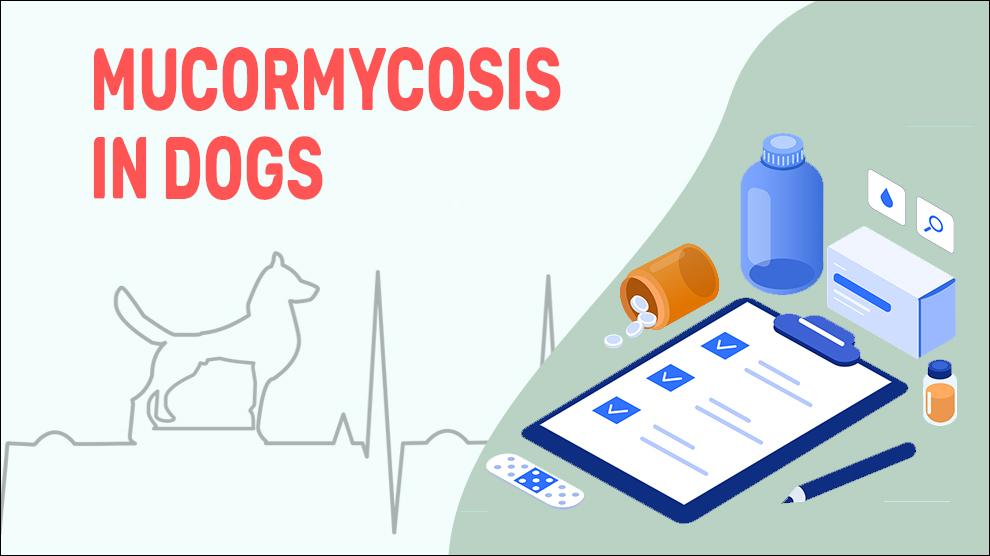Mucormycosis is a general term for infections caused by a group of fungal and mold species that affect dogs. The infection has the most effect on a dog’s gastrointestinal tract and skin.
Mucormycosis is caused by a class of Glomeromycetes species that also causes zygomycetes, lagenidiosis, pythiosis, etc. Mucormycosis fungus is considered an opportunistic pathogen and dogs that have suppressed or compromised immune systems are highly susceptible.
Depending on the underlying immunosuppression of the host, the clinical presentation of mucormycosis is broad and some overlapping exists. The clinical presentation of mucormycosis can be broadly grouped into: pulmonary, cutaneous, rhinocerebral, gastrointestinal, disseminated infections, and other uncommon presentations.
Usually, canine infections occur when the fungus enters the GI tract via the blood vessels. This will decrease the flow of blood and in due course, block all blood flow to the tissues resulting in necrosis, and causing extensive damage to the tissues. If not diagnosed quickly and treated properly, the affected dog will die.
Symptoms Of Mucormycosis
- Development of nodules/enlarged lymph nodes
- Lesions on the skin, sometimes draining and red
- Vomiting
- Pain and Inflammation in affected areas of the body
- Pneumonia or other GI problems
- Jaundice
Treatment Options For Mucormycosis
Commonly used Anti-fungal agents are azole antifungals including itraconazole, fluconazole, voriconazole and ketoconazole. They have relatively few side effects and are well-tolerated by most dogs.
Treatment of mucormycosis requires long-term medications (2-6 months in most cases)
Amphotericin B (Abelcet -The Liposome Company) is the "gold standard" of antifungal drugs
ketoconazole(less expensive than the other azole antifungals) or a combination of medications may also used in certain cases.
Home Remedies For Mucormycosis
The best home remedies (such as diets) for your dog undergoing treatment for fungal disease– depends on your dog.
Work with your vet to find the optimal dietary plan for your dog.
Home remedies such as herbs, diet and exercise will depend on your dog’s age and stage of disease they are in.
Prevention Of Mucormycosis
- Check and dispose overflowing waste bins and trash in the backyard carefully
- When going for walks, keep your dog away from rotting plant matter, dead leaves and other decayed substances in the woods
- Maintain your lawn or garden. Keep it neat and clean to avoid unwanted pests
- Ask your vet for good quality flea and tick preventatives
- Feed a high quality food and exercise regularly
Affected Breeds Of Mucormycosis
There is no breed disposition
Additional Facts For Mucormycosis
Causes:
This fungus grows on stored grains, compost piles, animal excreta, dead leaves, or other decomposing vegetation.
They get easily get transmitted to your dog when they roam outdoors. The fungi get attached to their skin and/or fur. The fungus sheds microscopic spores that float in the air to infect a host when inhaled or colonizing organic matter.
Your pet gets infected by inhalation of the fungi spores or by infected grains and other food particles.
Mortality:
When not diagnosed and treated properly, the affected dog will die.
Diagnosis:
- Blood tests
- A screening blood test called an agar-gel immunodiffusion (AGID) test
- antigen test (enzyme immunoassay or EIA)
Prognosis:
The prognosis for mucormycosis is really good.If left untreated, severe cases of Mucormycosis can be fatal for dogs, so head to your vet immediately.
When To See A Vet
It’s better to set up an appointment with your veterinarian if you notice-
- Draining skin lesions
- Enlarged lymph nodes
Food Suggestions For Mucormycosis
Nutrient-dense, vitamin-rich fruits and veggies
- Legumes, such as lentils, peas, or beans
- Cauliflower, cabbage, broccoli
- Spinach, kale, tomatoes, avocadoes
Plant-based proteins:
- Peas, chickpeas, lentils
High-fiber foods
- Whole-grain bread, rice, and cereal
- Green beans, Peas, Beet Pulp
- Flaxseed
Omega 3’s
- Tuna, salmon, cod, whiting, whitefish, etc
Conclusion
Mucormycosis Treatment is centered on the effective diagnosis of the aetiology.
For cases with localized infection, the prognosis is generally good.
The prognosis for mucormycosis and any other systemic infection varies inversely with delay in detection, severity, and evidence of sinus destruction.

















